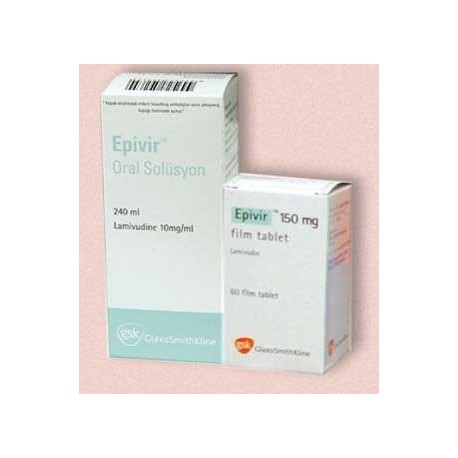 View larger
View larger Epivir (Lamivudine)150 Mg 60 Film Coated Tablets
EPV3990
New product
BUY MORE PAY LESS
| Quantity | Discount | |
|---|---|---|
| 2 | 5% | |
| 3 | 10% | |
| 4 | 15% | |
| 5 | 20% |
Volume discounts
| Quantity | Discount | You Save |
|---|---|---|
| 2 | 5% | Up to $9.50 |
| 3 | 10% | Up to $28.50 |
| 4 | 15% | Up to $57.00 |
| 5 | 20% | Up to $95.00 |
More info
EPIVIR 150 mg Film Tablet is taken orally.
Active ingredient
It is lamivudine. Each tablet contains 150 mg of lamivudine.
Excipients
Microcrystalline cellulose, sodium starch glycolate, magnesium stearate, Opadry YS-1-7706-G White (hydroxypropyl methylcellulose USP, titanium dioxide E171, polyethylene glycol, polysorbate 80).
1. What EPIVIR is and what it is used for
EPIVIR is an antiviral medicine belonging to the group called nucleoside reverse transcriptase inhibitors. It is used in combination with other antiretroviral drugs to treat the disease in adults and children with HIV infection.
EPIVIR is available in polyethylene bottles of 60 tablets with a safety cap.
2. How to use EPIVIR?
Instructions for proper use and dose/frequency of administration
Adults and adolescents over 12 years: The recommended dose of EPIVIR is 300 mg per day. This dose may be appropriate as 150 mg twice daily or 300 mg once daily. The 300 mg tablet is suitable for once daily administration only.
Patients switching to once-daily therapy should take 150 mg twice daily and switch to 300 mg once daily the next morning. When it is preferred to be taken once a day in the evening, 150 mg of Epivir should be taken only in the first morning, followed by 300 mg taken in the evening. When returning to twice daily therapy, patients should complete their daily therapy and start 150 mg twice daily administration the next morning.
Application route and method
EPIVIR tablets are taken orally.
For patients and children who cannot take tablets, EPIVIR is also available in an oral solution form.
Use in children
Children with a body weight of at least 30 kg: The recommended dose of EPIVIR is 300 mg per day. Today too
It can be given as 150 mg twice or 300 mg once a day.
In children weighing between 21 kg and 30 kg: The recommended oral dose of EPIVIR (150 mg) is 1 half tablet taken in the morning and 1 tablet taken in the evening.
Children weighing between 14 kg and 21 kg: The recommended oral dose of EPIVIR (150 mg) is 1 half-scooped tablet taken twice a day.
The limited data available for children less than 3 months of age are not sufficient to make specific dosing recommendations.
Use in the elderly
Special care is recommended for this patient group, as there will be decreased kidney functions and changes in blood values in the elderly.
Special use cases
Kidney failure: If you have kidney failure, your doctor will ask you to do some tests and will adjust the dose of your medicine according to the results of these tests.
Liver failure: Consult your doctor if you have liver failure.
If you have the impression that the effect of EPIVIR is too strong or too weak, talk to your doctor or pharmacist.
3. What are the possible side effects?
Like all medicines, there may be side effects in people who are sensitive to the substances contained in EPIVIR.
If any of the following occur, stop using EPIVIR and IMMEDIATELY inform your doctor or go to the nearest hospital emergency department:
No very serious side effects have been reported for EPIVIR.
If you notice any of the following, tell your doctor immediately or go to the nearest hospital emergency department:
• Decrease in the number of white blood cells called neutrophils in the blood (Neutropenia)
• Anemia (Anemia)
• Decrease in the number of platelets that allow blood to clot (Thrombocytopenia)
• Increase in the level of the enzyme (AST, ALT) produced in the liver and called transaminase
• Lactic acid accumulation in the blood (lactic acidosis) with symptoms such as deep, rapid and difficult breathing, dizziness, numbness and weakness in the arms and legs, stomach pain, nausea and vomiting.
• Individuals with advanced HIV infection (AIDS) have a very weak immune system and are more likely to develop serious infections (opportunistic infections). When treatment is started in these people, old, latent infections may flare up and develop signs and symptoms of inflammation.
• Inflammation of the pancreas (pancreatitis)
• Increase in the level of enzyme called amylase in the blood
• A clinical syndrome that includes clinical myoglobinuria (Rhabdomyolysis), which is a disease that develops due to damage or destruction of skeletal muscle due to various causes and progresses with acute kidney failure and the presence of muscle protein called myoglobin in the urine.
• Inability of the bone marrow to produce red blood cells (Pure erythrocyte aplasia)
• Numbness in any body area (Paresthesia)
• Nerve disease in the arms and legs
These are serious side effects. Emergency medical attention may be required.
Tell your doctor if you notice any of the following:
• Excessive production of lactate (Hyperlactatemia)
• Headache
• Nausea
• Vomiting
• Upper abdominal pain
• Diarrhea
• rash
• Hair loss (alopecia)
• Weakness
• Fracture
• Fire
• Muscle pain and discomfort
• Insomnia
• Cough
• Discomfort or discharge in the nose

